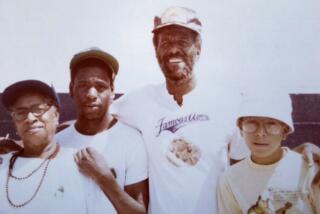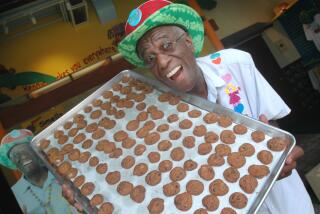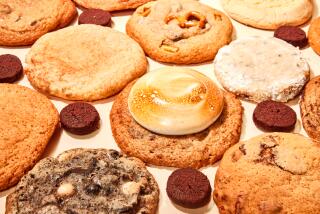Surprise Ancestry of the Fortune Cookie
- Share via
SAN FRANCISCO — Some might say no Chinese meal is complete without the fortune cookie. But in China, fortune cookies are considered a foreign concept--introduced by Americans and shipped across the Pacific.
“There’s no such thing as a Chinese fortune cookie,” says Erik Hagiwara-Nagata, the great-great-grandson of the man credited with “inventing” the fortune cookie. “It’s a Japanese tea cookie.”
In Japan, the folded cookies with a message tucked inside are called tsuzura senbei and are often served with tea. But it took a Japanese-American gardener and some enterprising Chinese-American merchants to turn the treat into a novelty that has become as American as pizza and French fries.
Makoto Hagiwara, a Japanese lord who emigrated to California, designed and tended the Japanese Village, a display of traditional Japanese life at the 1894 Midwinter International Exposition in Golden Gate Park.
He then presented the garden to the city, later serving the crackers that would become best known as “fortune cookies” with tea at the pavilion renamed the Japanese Tea Garden.
“I guess you could say the fortune cookie was invented here for the sake of introducing it to the rest of the world,” says Hagiwara-Nagata, a landscape architect who tends the gardens his great-great grandfather designed.
It’s a simple recipe--eggs, flour, butter, sugar. Hagiwara never thought to patent the recipe. It wasn’t long before some savvy Chinese-American merchants saw the novelty of the fortune cookies and installed their own factories in Chinatown.
And when World War II made enemies of the Japanese--prompting the internment of 120,000 Japanese Americans, including the Hagiwaras--Chinese Americans seized the chance to claim a place in American culture.
Gregory Louie’s grandfather, a truck driver, was looking for a little side income when he and his son bought a fortune cookie-making machine from a Japanese-American baker in 1948.
Lotus Fortune Cookies was a family affair run by aunts, uncles and children. Family lore says Louie’s grandfather named it “lotus,” saying, “Gee, there’s a lot of us.”
The Louies hooked up with the restaurateur Johnny Kan, who added a touch of glamour to Chinese dining and served up fortune cookies at the end of every meal.
“He did a lot of Hollywood people coming up [to San Francisco],” Louie recalls. “He was the first one who made the original Chinese takeout . . . catering to Caucasians.”
In 1968, Lotus moved downtown. Today, sayings culled from Confucius and the Farmer’s Almanac have made way for Hebrew phrases and poetry.
Nowadays, the only fortune cookie factory left in Chinatown is Golden Gate Fortune Cookies Co. along Ross Alley, a narrow, brick-lined passage once infamous for its gambling houses.
Little has changed since Franklin Yee opened his shop 36 years ago. The dimly lit room is cluttered with teapots, a shrine and calendars that date back to 1962, his first year of business.
Two women sit in front of moon-shaped ovens where they grab the round cookies warm off a rotating carousel, slip in a fortune and curl them around a metal wand.
Nearby, an elderly woman settled in a bamboo chair snips sheets of fortunes printed by computer. In one corner, atop boxes, an old cookie tin holds “French” fortunes --with such bawdy messages from “Fu Ling Yu” as “Orgy is group therapy.”
“There were quite a few more cookie factories when I was a child than there are now,” says Enid Lim, 66, a Chinatown native who grew up on Ross Alley, where her father ran a mah-jongg parlor. “But we knew that fortune cookies weren’t really Chinese--just like we knew chop suey wasn’t Chinese.”
More to Read
Sign up for The Wild
We’ll help you find the best places to hike, bike and run, as well as the perfect silent spots for meditation and yoga.
You may occasionally receive promotional content from the Los Angeles Times.






